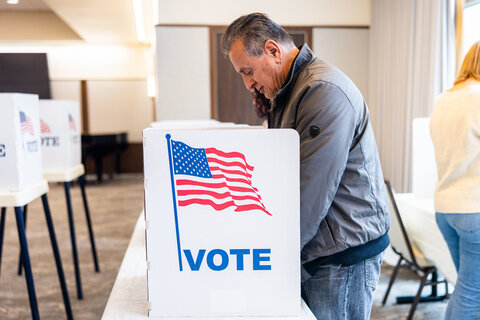Voters in ten or so states this month turned down proposals to change the way elections are held, and reformers will be taking time to absorb the lessons. But I’d caution against treating this, as some headline writers have done, as a general rejection of ranked choice voting (RCV), which figured in many of the proposed ballot measures.
Start by distinguishing between two kinds of reform: 1) RCV standing by itself, and 2) the ambitious kind of reform pioneered by Alaska, which abolishes party primaries and then employs RCV in a general election held among the top several finishers. I’ve outlined in several posts why I like the Alaska idea, but voters in five Western states declined, by narrow or wide margins, to adopt versions of it. Meanwhile, Alaska voters themselves appear to be narrowly voting to retain the reforms against a repeal attempt, if current trends hold.
Should we be surprised? For all the promise of the Alaska model as a way to reduce polarization and clear a path for candidates with cross-party support to make it onto the general election ballot, it can seem like a great leap into the unknown, to say nothing of complicated. It’s been road-tested only in one unusual state that isn’t very populous, and only for a few years. No one is quite sure how it will affect the role of political parties, or what strategies candidates may devise to get around the competitive forces the reform is meant to unleash.
Add in communication and messaging problems, and it’s surprising how well the proposal did —losing by only a 49–51 margin in Montana, 47–53 in Nevada (where it had been on the ballot once before), and 46–54 in Colorado. It’s common for far-reaching reforms to lose at first and eventually start winning as designs are refined and voters grow more comfortable with the idea. That’s what happened with citizens’ redistricting commissions, which started in Arizona and took many years to spread to California and eventually elsewhere.
What about stand-alone RCV, a more familiar reform idea with a much longer track record? Well, despite being turned down by Oregon voters, it continued to gain ground overall, as it has been doing for years. Continuing a long streak of municipal wins, it passed by a convincing 73–27 in Washington, DC, population 680,000, and Oak Park, Illinois, population 50,000.
The politics also differ. In every state where there has been an attempt to introduce the Alaska-style universal primary, it has drawn sustained fire from establishments of both parties. (To their credit, some elected Democrats in Colorado, led by Gov. Jared Polis, did support it this year.) Political machines like that of Harry Reid in Nevada detest these ideas, and so these days do both standard movement conservatives and interest groups that power the Democratic Party, such as progressive clubs and unions.
All prize the leverage of being able to take down candidates in the party primary if they don’t toe the desired line. On the whole, RCV finds more of a footing in places where politics is dominated by one party—large cities are the model case—and where reformers can pitch it as a way to make primaries work better.
This year, RCV played a crucial role in San Francisco voters’ repudiation of far-left governance, enabling more moderate Democrats to unite through second and third choices against socialist Supervisor Dean Preston, who had led in the first round. That’s just one of many pieces of evidence that reforms of this sort are not somehow stacked in favor of the left side of the political spectrum, but rather, if anything, tend to empower normie voters against obsessives.

